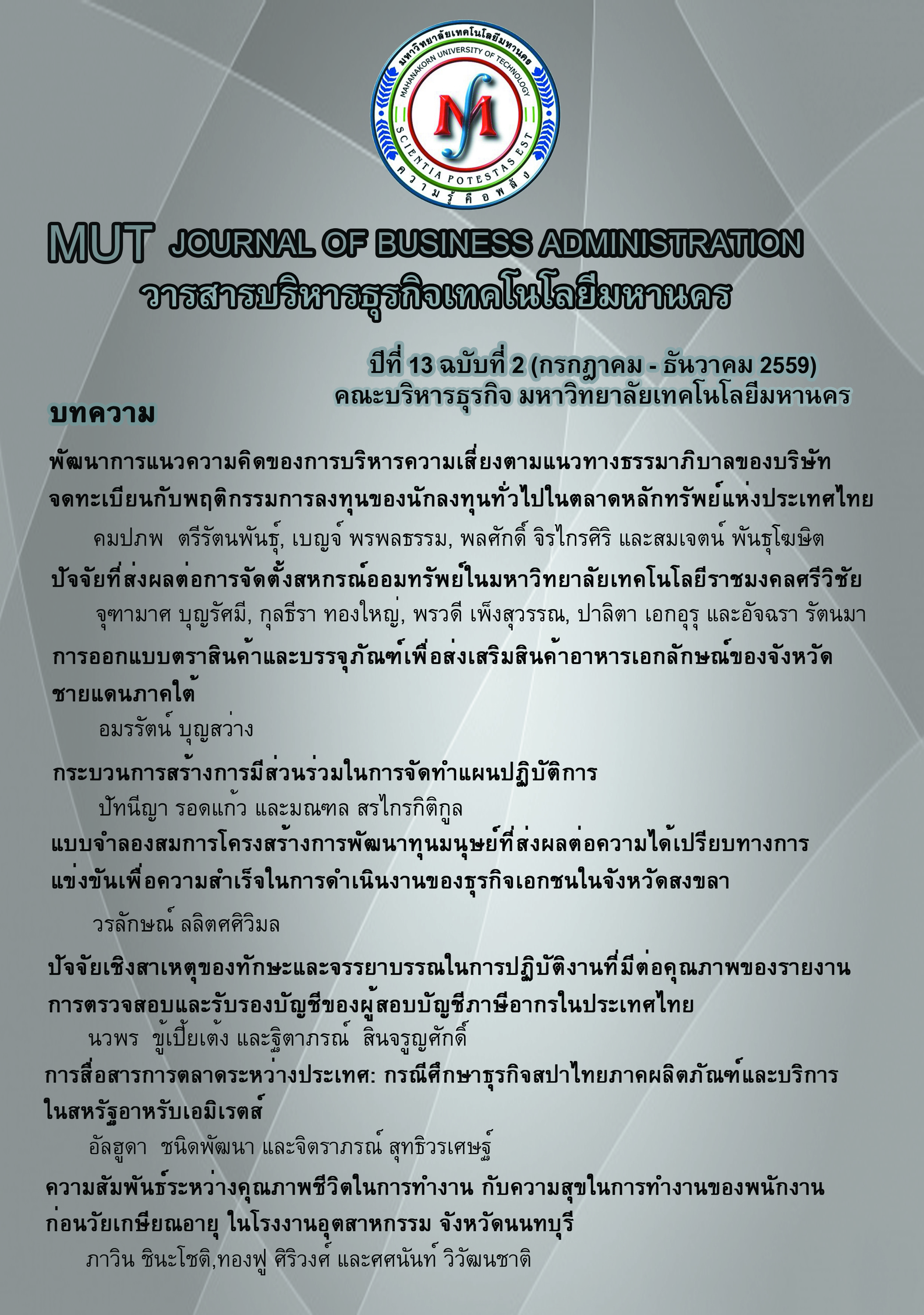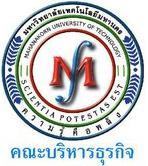แบบจำลองสมการโครงสร้างการพัฒนาทุนมนุษย์ที่ส่งผลต่อ ความได้เปรียบทางการแข่งขันเพื่อความสำเร็จในการดำเนินงานของ ธุรกิจเอกชนในจังหวัดสงขลา
Keywords:
การพัฒนาทุนมนุษย์, ความได้เปรียบทางการแข่งขัน, ความสาเร็จในการดาเนินงาน, ธุรกิจเอกชน, Human Capital Development, Competitive Advantage, Performance Success, Private BusinessesAbstract
การวิจัยครั้งนี้มีวัตถุประสงค์เพื่อศึกษาแบบจำลองสมการโครงสร้างความสัมพันธ์ของการพัฒนาทุนมนุษย์ที่ส่งผลต่อความได้เปรียบทางการแข่งขันเพื่อความสำเร็จในการดำเนินงานของธุรกิจเอกชนในจังหวัดสงขลา ใช้วิธีการวิจัยเชิงปริมาณ (Quantitative Research) เก็บข้อมูลจากกลุ่มตัวอย่างที่เป็นผู้ประกอบการหรือผู้บริหารฝ่ายทรัพยากรมนุษย์ในจังหวัดสงขลา จำนวน 400 คน ด้วยวิธีเลือกแบบเจาะจง (Purposive Sampling) เครื่องมือที่ใช้ในการเก็บข้อมูลได้จากแบบสอบถามและใช้โปรแกรมทางสถิติในการวิเคราะห์ข้อมูล ผลการวิจัยพบว่า การวิเคราะห์แบบจำลองตามทฤษฎีสอดคล้องกลมกลืนกับข้อมูลเชิงประจักษ์ X2 = 65.271, df = 50, X2/df = 1.305, p-value = 0.072, GFI = 0.976, CFI = 0.996, RMR = 0.015 และ RMSEA = 0.028 ตามลำดับ ผลการทดสอบสมมติฐานพบว่า การพัฒนาทุนมนุษย์มีอิทธิพลทางตรงต่อความได้เปรียบทางการแข่งขัน การพัฒนาทุนมนุษย์มีอิทธิพลทางตรงต่อความสำเร็จในการดำเนินงาน และความได้เปรียบทางการแข่งขันมีอิทธิพลทางตรงต่อความสำเร็จในการดำเนินงาน ดังนั้นผู้ประกอบการหรือผู้บริหารฝ่ายทรัพยากรมนุษย์ของธุรกิจเอกชนควรให้ความสำคัญกับการพัฒนาทุนมนุษย์ในทุกด้าน เพื่อนำพาองค์กรให้ประสบความสำเร็จในการดำเนินงาน และเป็นการสร้างความได้เปรียบทางการแข่งขันให้ทันต่อการเปลี่ยนแปลงของสภาพเศรษฐกิจในปัจจุบัน
The Structural Equation Model Human Capital Development Affecting the Competitive Advantage for Performance Success of Private Businesses in Songkhla Province
This research aimed to study the structural equation modeling human capital development affecting the competitive advantage for performance success of private businesses in Songkhla. The quantitative research method was conduct, using the purposive sampling method, the sample of 400 entrepreneurs or human resources executives in Songkhla was chosen. Data were collected by questionnaires, and were analyzed using a statistical program software. The results found that the structural equation model, including goodness of fit showed the empirical data of X2 = 65.271, df = 50, X2/df = 1.305, p-value = 0.072, GFI = 0.976, CFI = 0.996, RMR = 0.015 and RMSEA = 0.028. Consequently, hypothesis testing revealed that the human capital development had significant direct effects on competitive advantage. The human capital development had significant direct effects on performance success, and competitive advantages had significant direct effects on performance success. Therefore, the entrepreneurs or human resources executives of private businesses should pay more attention to the human capital development in all aspects, to lead the successful organization and to create competitive advantage to keep pace with the dynamics of the current economic conditions.
Downloads
Issue
Section
License
ข้อความ ข้อคิดเห็น ข้อมูล เนื้อหา รูปภาพ แผนภูมิ แผนผัง เป็นต้น ที่ปรากฏและแสดงในบทความต่างๆ ในวารสารบริหารธุรกิจเทคโนโลยีมหานคร ถือเป็นความรับผิดชอบโดยตรงของผู้เขียนบทความนั้นๆ มิใช่เป็นความรับผิดชอบใดๆ ของวารสารบริหารธุรกิจเทคโนโลยีมหานคร และมหาวิทยาลัยเทคโนโลยีมหานคร
บทความที่ตีพิมพ์ในวารสารบริหารธุรกิจเทคโนโลยีมหานคร ถือเป็นลิขสิทธิ์เฉพาะของคณะบริหารธุรกิจ มหาวิทยาลัยเทคโนโลยีมหานคร หากบุคคลหรือหน่วยงานใดต้องการนำทั้งหมดหรือส่วนใดส่วนหนึ่งไปเผยแพร่ต่อหรือเพื่อกระทำการใดๆ จะต้องได้รับการอนุญาตเป็นลายลักษณ์อักษรจากคณะบริหารธุรกิจ มหาวิทยาลัยเทคโนโลยีมหานครก่อนเท่านั้น


